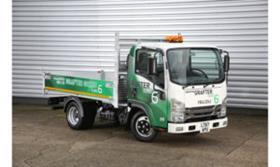Leaving the EU without a deal would be “absolutely dreadful” for truck makers and buyers alike, making new vehicle acquisition prohibitively expensive, according to manufacturers.
With the threat of crashing out of the EU a very real possibility, there are mounting concerns at the sky-high vehicle import tariffs that will come into play in the event of no deal.
Government plans include slapping 22% on the cost of importing a new HGV from mainland Europe from 11pm on 29 March for up to 12 months.
Isuzu Trucks UK MD Pete Murphy said he did not understand why the government had sought to protect the car industry with tariffs of 10% yet truck makers were facing an extra 12% on top.
The company’s Grafter model (pictured) is made in Japan and assembled for the UK market in Verona, Italy.

“When you consider chassis cabs are designed to deliver products, and in some cases deliver essential products, why is there a 12% uplift? Particularly for vehicles used to deliver in multi-drop, ultra-urban environments – the same environment where the government is looking for an increase in air quality,” he said.
Murphy added: “It’s absolutely dreadful news. It’s supposed to be a temporary measure applied until an agreement is reached with the EU. We will have stagnation of the industry. Anyone who can wait until the tariffs are removed will do that.”
Scania also referenced the effect of the tariffs on tackling air pollution. Martin Hay, MD of Scania (Great Britain), said: “We agree this potentially places a massive burden on industry and makes it even more difficult for hauliers to comply with clean air zones if they currently run older vehicles and need to upgrade to Euro-6.”
Leyland
DAF Trucks assembles the majority of its UK-registered vehicles in the UK and believes it won’t be subject to the full import tariff.
However, Phil Moon, DAF Trucks marketing manager told motortansport.co.uk: “We continue to hope for a deal. Tariffs are just one aspect of it, obviously. The potential implications for the overall economy of a no-deal scenario are things we want to avoid.”
There are other consequences for the overall economy and UK truck market in general that might bring more uncertainty.
“It could slow down the natural replacement cycle for older vehicles. It’s not necessarily good news for a manufacturer, even with a UK manufacturing base.”
The RHA described the situation as “ludicrous” and said 22% tariffs would cripple UK hauliers, with many businesses already struggling to make ends meet on profit margins around 2%.

Richard Burnett, RHA chief executive, said: “There is no sensible scale to these increases. They range from a 10% tariff for a vehicle under five tonnes, while anything over – with the exception of special purpose vehicles – will be charged at 22%.

“With the average price of a tractor unit with an engine rating of Euro-6 starting at around £85,000, the prospect of paying over £100,000 for a new truck will, for many, make new vehicle acquisition almost impossible.
“UK hauliers, particularly those already at a loss as regards future border crossing processes, will now be faced with massive, additional financial burdens.
“For those who can afford these excessive tariffs, they will have no alternative but to increase their rates by a substantial amount. For those unable to pass the additional cost on, there’s a real risk Brexit will be the final straw.”
Dave Ashford, transport director at KBC Logistics in Purfleet, agreed that some hauliers would struggle to sustain such high cost increases.
“We always buy two or three years old, however I am sure the cost of new will have an effect on used prices in due course.
“With the changes in London emissions and other cities to follow suit, I am sure some will throw the towel in,” he said.
He added: “I have sincere worries. I have to inform senior colleagues in Japan of the various scenarios that could play out and some of it, I wouldn’t blame them for not believing me.
Murphy said Isuzu Trucks had put in place contingency plans in an attempt to mitigate the effect of tariffs and added: “I am pinning my hopes on either her [the prime minister’s] plans for a third vote being successful, or there’s a significant delay and in the meantime there’s real productive negotiations.”
Murphy added: “We have a smaller range of vehicles that have a 1.9-litre engine and they would be [subject to] 10% just like cars would be, but that’s our 3.5-tonne product range.
“We have another 3.5-tonne product with a bigger engine and suddenly that will cost an extra 22%. And everything after that up to 13.5 tonnes will be 22%.”














